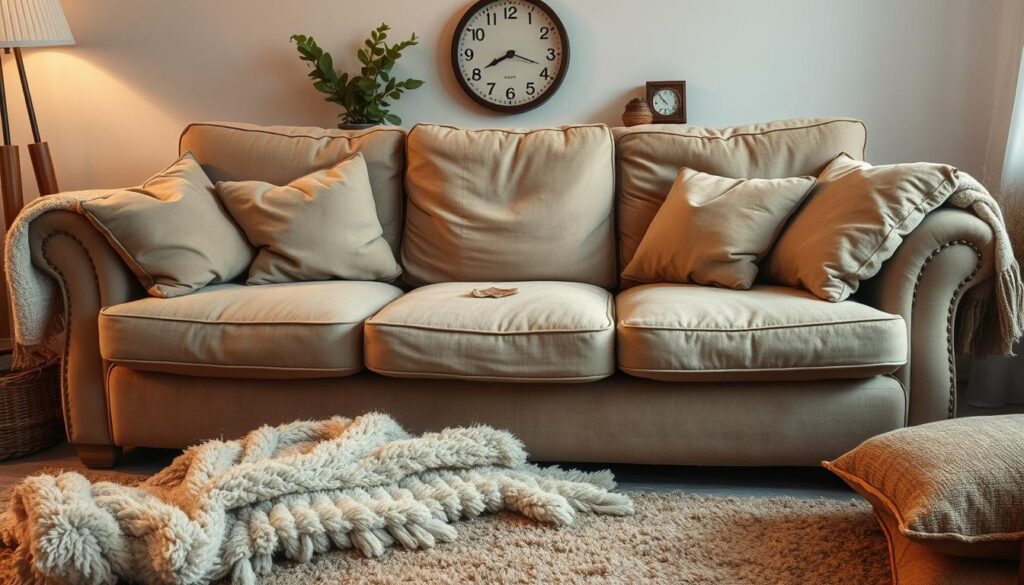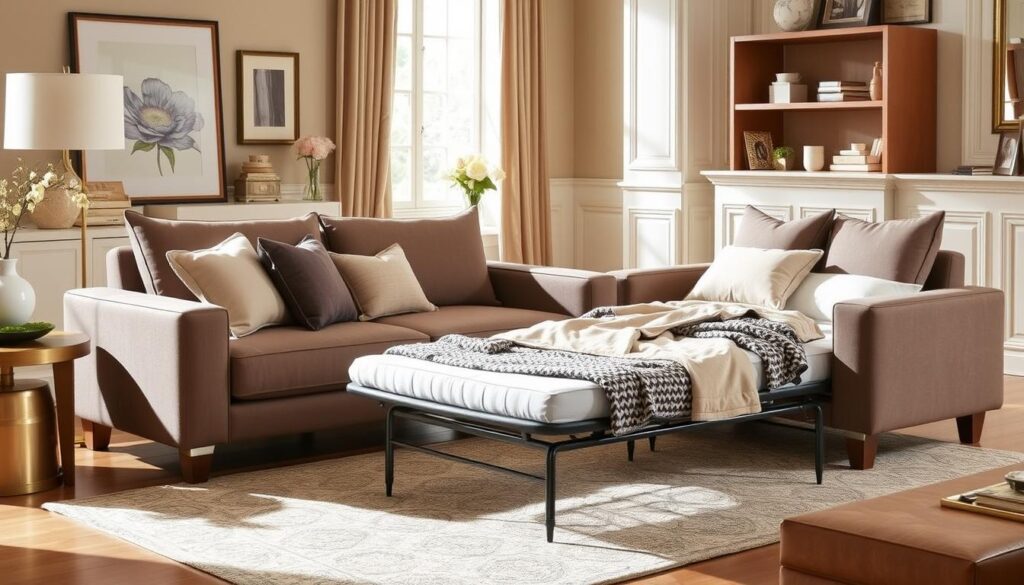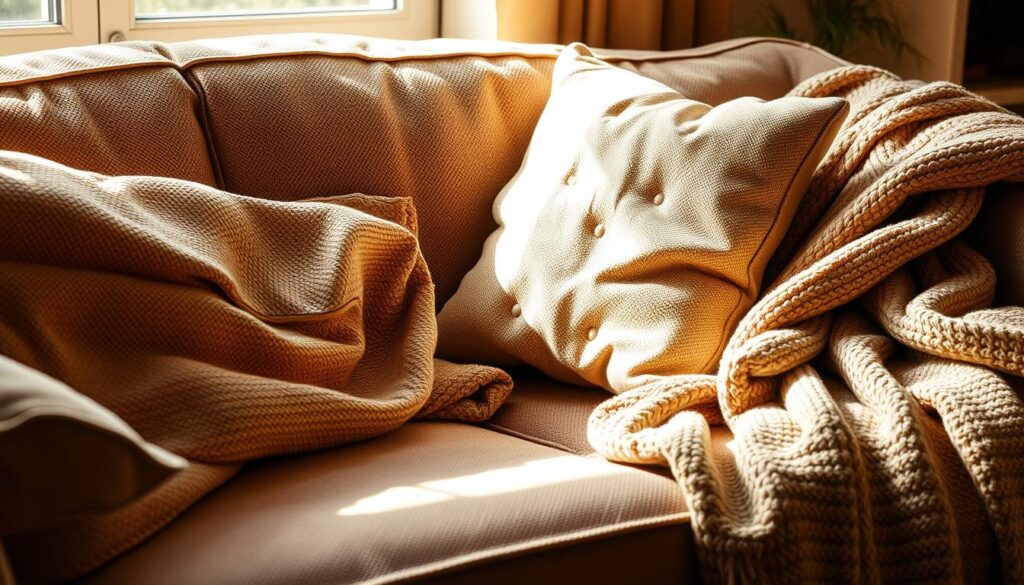Affiliate Disclosure
Sofa Insider Guy is a participant in the Amazon Services LLC Associates Program, an affiliate advertising program designed to provide a means for sites to earn advertising fees by advertising and linking to Amazon.
Ever thought about Does Sleeping on a Sofa Ruin It? A comfy sofa might seem like the ideal nap spot. But, the long-term effects of couch sleeping can be quite surprising. We’ll look into the risks and how to keep your sofa in top shape.

Key Takeaways
- Sleeping on a sofa can lead to sagging cushions, damaged frames, and overall deterioration of the furniture over time.
- Couches are designed for sitting, not extended periods of sleeping, which can significantly reduce their lifespan.
- Regular cleaning, rotating cushions, and avoiding sitting in the same spot can help prolong the life of your upholstered furniture.
- Understand the importance of proper spinal alignment and the impact of couch sleeping on your overall health.
- Explore alternative sleep solutions, such as a sleeper sofa, to enjoy the comfort of your living room without compromising the longevity of your couch.
Table of Contents
Understanding the Risks of Couch Sleeping
Sleeping on the couch sometimes might seem okay. But, it can really harm your health and well-being. It can mess up your spine and make you feel dirty. It’s important to know why the couch is not a good place to sleep.
Lack of Support and Spinal Alignment
Couches don’t support your body like a bed does. Without a good mattress, your spine can get out of line. This can cause neck and back pain and even long-term posture problems. The risks of sleeping on couch and couch sleep posture issues can really hurt your sleep and health.
The Unhygienic Nature of Couches
Couches collect dust, pet hair, and even mold. This couch sleep hygiene concerns can make you allergic and keep you awake. It can lead to more couch sleeping health risks and poor health.
The problems with sleeping on sofa might seem small. But, they can really affect your sleep, comfort, and health. It’s key to think about the why sleeping on couch is bad and choose better sleeping habits.

Our Recommendation
Sleeper Sofa with Storage Chaise, Tufted L Shape Convertible Couch with 2 USB & Cup Holders, Dark Grey
How Sleeping on a Sofa Affects Your Health
Sleeping on the couch sometimes might not seem bad. But, it can really hurt your health if you do it a lot. It can mess up your sleep and even make you more likely to get allergies.
Poor Sleep Quality and Posture
Not having the right support and not sleeping right can cause a lot of problems. You might get neck and back pain, feel stiff, or even have sleep apnea. Your body doesn’t sleep right, so you might feel really tired, even after sleeping a lot.
Increased Risk of Allergies and Mental Health Issues
Couches can collect dust, dander, and other things that can make breathing hard and cause allergies. Also, not sleeping well can make you more likely to feel anxious or depressed.
So, even though the couch might look comfy, it’s not good for you in the long run. You need to take care of your sleep and have a good place to rest. This is important for your body and mind to stay healthy.
Couch vs. Bed: A Comparative Analysis
Choosing between a couch and a bed can greatly affect your sleep quality. Both offer a place to rest, but they differ in important ways.
Beds are designed for full-body support and comfort. They have mattresses and frames for spinal alignment and pressure relief. Couches, on the other hand, are for short-term relaxation and may not offer the right support.
| Feature | Couch | Bed |
|---|---|---|
| Spinal Alignment | Inconsistent and often poor | Optimized for proper alignment |
| Comfort Level | Comfortable for sitting, but may not provide adequate support for sleeping | Designed for extended periods of lying down and sleeping |
| Sleep Quality | Potentially lower due to lack of proper support and alignment | Typically higher due to the dedicated design for sleeping |
The hygiene factor is also key. Beds are cleaner and less likely to have dust, pet hair, and allergens. Couches can collect these irritants, especially if used for sleeping often.
In conclusion, a dedicated bed is better for sleep and health than a couch. Beds offer better spinal alignment, comfort, and hygiene. They are the best choice for a good night’s sleep.

Our Recommendation
Oversized Sectional Sleeper Sofa with Chaise Lounge and Pull Out Bed, 7-Seater U-Shaped Sectional Couches with Cuddler for Living Room
Is a Sleeper Sofa a Better Alternative?
The debate between sleeper sofa vs regular bed isn’t easy to solve. Sleeper sofas are great for saving space, but they might not be the best for sleeping. Let’s look at the good and bad sides of these versatile pieces.
Sleeper sofas are perfect for small spaces because they have a hidden mattress. This mattress can be pulled out to make a bed. Trundle sleeper sofas even have an extra mattress under the main seat, adding more flexibility.
“Sleeper sofas can be a great space-saving solution, but they may not provide the same level of comfort and support as a traditional bed.”
But, sleeper sofas might not be as comfy as regular beds. Their mattresses are thinner and less supportive. This can hurt your back and affect your sleep quality, which is bad for your health.
On the other hand, a daybed might be a better choice for a versatile sleeping spot. Daybeds use a regular mattress in a couch-like design. They often offer better support and comfort than sleeper sofas.
Choosing between a sleeper sofa and a regular bed (or daybed) depends on your needs and space. Sleeper sofas are handy for saving space, but think about the sleep quality and support they offer.

Tips for Avoiding Couch Sleep
It’s tough to stop sleeping on the couch, but it’s doable. You can take back your bed and sleep better. The trick is to keep good sleep habits and make your bedroom perfect for sleep.
Establishing Good Sleep Hygiene
Keeping a regular sleep schedule is key. Go to bed and wake up at the same time every day. This helps your body get into a rhythm.
Before bed, try relaxing activities like reading or stretching. It tells your body it’s time to sleep.
Problems like watching TV late or a snoring partner can make you sleep on the couch. Cut down on screen time and use earplugs or a white noise machine for a quiet night.
Optimizing Your Bedroom Environment
Your bedroom’s setup affects how well you sleep. Make it cool, dark, and quiet. A comfy mattress and pillows are essential for a good night’s sleep.
Use blackout curtains or an eye mask to block out light. These changes can help you sleep better in your own bed.
By following these tips, you can stop sleeping on the couch. Create good sleep habits and make your bedroom sleep-friendly. Enjoy better sleep in your own bed.
Does Sleeping on a Sofa Ruin It?
Sleeping on a sofa might seem comfy, but it can harm your furniture. The repeated pressure and body oils can damage it. Plus, the lack of proper support shortens your sofa’s life.
The cushions on your sofa can break down from your weight. This makes the sofa less comfy and weakens the frame. It’s not just about comfort; it’s about the sofa’s structure too.
Also, your skin oils and sweat can stain the fabric. This is a big problem for light or delicate materials. It makes keeping your sofa looking new hard.
| Signs of Couch Damage from Sleeping | Ways Sleeping Can Shorten Sofa Lifespan |
|---|---|
|
|
Even though the couch looks inviting, it’s not made for sleeping. Being careful with your sofa can keep it looking great for a long time.

“Couches are meant for sitting, not sleeping. Frequent couch napping can lead to premature wear and tear, compromising the sofa’s lifespan and comfort.”

Our Recommendation
Loveseat Sleeper USB Port Pull Out Couch with Nailhead Trim, 3 in 1 Sofa Bed Adjustable Backrest with 2 Pillows, Grey
Temporary Benefits of Couch Sleeping
While sleeping on a couch can have risks, it has some benefits in certain situations. For those with insomnia, the couch’s change of scenery can help. It makes it easier to fall asleep.
Alleviating Insomnia Symptoms
The couch’s cushioned comfort and higher position can be better for rest than a bed. This is especially true for those with chronic insomnia. The benefits of sleeping on couch include better sleep quality and quicker sleep onset. It offers relief from the frustration of not sleeping well in bed.
Staying Comfortable While Sick
When you’re sick, the couch can be very helpful. Its elevated position and soft support ease congestion, body aches, and other symptoms. This makes it easier to get couch sleeping for insomnia relief and couch sleeping when sick.
But, these benefits are temporary. A dedicated, supportive sleep surface is best for long-term sleep health and furniture life.
| Benefit | Explanation |
|---|---|
| Insomnia Relief | The change of environment and cushioned comfort of a couch can help individuals with insomnia fall asleep more easily. |
| Illness Management | The elevated position and support of a couch can provide relief for symptoms like congestion and body aches when sick. |
Making the Best of Couch Sleeping
Sleeping on a couch might not be the best option, but there are ways to make it better. By using a few simple strategies, you can improve your couch sleeping experience. This can help reduce some of the downsides.
First, try elevating your head and neck to keep your spine aligned. You can use pillows or fold a blanket to support you. Also, side sleeping is often the most comfortable on a couch.
To make your couch feel more like a bed, add a fitted sheet to the cushions. This small change can make a big difference in comfort.
- Elevate your head and neck for better spinal alignment
- Use pillows or blankets to create a firmer sleep surface
- Experiment with side sleeping for optimal comfort
- Add a fitted sheet to the cushions for a more bed-like feel
Also, try to avoid screens and electronic devices before bed. The blue light they give off can mess with your sleep. If you’re sleeping on the couch often, check if there’s a health issue that needs attention.
By using these couch sleeping hacks and strategies for better couch sleep, you can improve your situation. Remember, your comfort and sleep quality are key, even when you’re on the couch.
“A good night’s sleep is essential for our overall health and well-being, no matter where we lay our heads.”
Addressing Underlying Health Concerns
Some people might find temporary relief by sleeping on a couch. But, it’s key to tackle the health issues that cause this. Problems like sleep apnea, heartburn, or acid reflux can make it hard to sleep well in a regular bed.
Instead of just fixing the couch sleeping symptom, we should focus on the main health problem. By treating the root cause, people can sleep better in a proper bed. This can also help their furniture last longer.
Identifying and Treating Underlying Health Conditions
If you often sleep on the couch because of discomfort or health issues, see a doctor. They can find the main health problem and suggest treatments. This could include:
- Sleep apnea treatment, like using a CPAP device
- Medicines or lifestyle changes for heartburn or acid reflux
- Physical therapy for musculoskeletal issues that affect sleep
By tackling the main health issues, you can feel better and sleep better in a proper bed.
Prioritizing Healthy Sleep Habits
It’s also vital to develop healthy sleep habits to sleep in a proper bed again. This includes:
- Keeping a regular sleep schedule
- Having a calming bedtime routine
- Keeping your bedroom cool, dark, and quiet
- Reducing screen time and caffeine before bed
By focusing on good sleep habits and health, you can sleep better and keep your couch in good shape.
Breaking the couch sleeping cycle starts with finding and fixing the main health issues. With the right help from doctors, you can enjoy a comfortable bed again. This will also help your furniture last longer.

Our Recommendation
Multifunctional Loveseat Sofa, Easily Converts from Sofa Couch to Sofa Bed, Comfortable Thick Seat Cushion, Suitable for Both Living Rooms and Apartments, Beige
Conclusion
Sleeping on a couch regularly can harm your health and shorten your furniture’s life. Couches lack the support and hygiene of beds. This can cause sleep issues, pain, allergies, and even mental health problems.
While couches might seem convenient sometimes, experts say beds are better for long-term health and furniture life. Good sleep habits, a clean bedroom, and treating health issues can help you sleep better in a bed.
It’s important to avoid sleeping on sofas to protect your health and furniture. Switching to a bed can improve your sleep and keep your furniture in good shape. This way, you’ll enjoy a healthier and more comfortable sleep space for years.
FAQ
Does sleeping on a couch really damage the furniture?
Yes, sleeping on a couch regularly can shorten its life. The pressure, oils, and lack of support cause problems. These include sagging cushions and damaged frames.
What are the health risks of sleeping on a couch?
Couch sleeping can harm your health. It can lead to poor sleep, neck and back pain, and allergies. It may also affect your mental health.
How does sleeping on a couch compare to sleeping in a bed?
Beds are made for long sleep periods, offering full support. Couches are for short rests and lack the support of a mattress and bed frame.
Are sleeper sofas a better alternative to regular couches for sleeping?
Sleeper sofas save space but may not be as good for sleep as a bed. Their mattresses are thinner, and design can cause spinal issues.
How can I avoid the habit of sleeping on the couch?
Good sleep habits and a comfy bedroom can help. Also, fix any health issues that make you sleep on the couch.
Are there any temporary benefits to sleeping on a couch?
Sometimes, a couch can help with insomnia or illness. But, it’s not a long-term solution. A proper bed is better for sleep health.
How can I make the best of couch sleeping when it’s necessary?
Use pillows and blankets for support. Keep your head and neck elevated. Add a sheet to the cushions. Fix any health issues that make you sleep on the couch.

